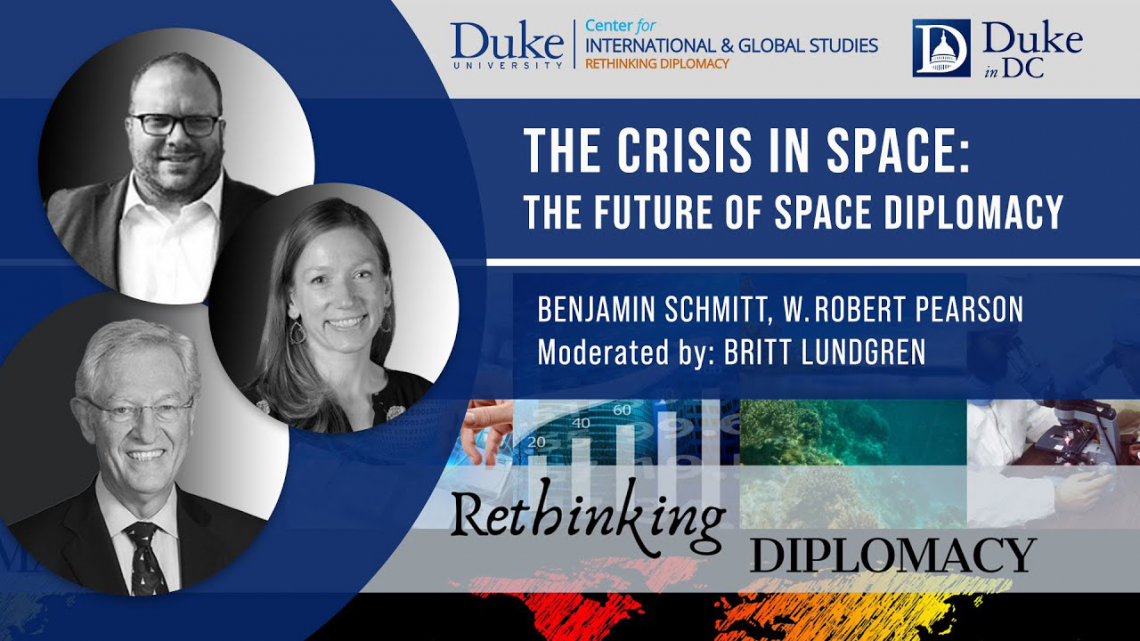
With the proliferation of human activity in space, humanity risks repeating the mistakes that saw unbridled competition over scarce resources lead to wars, former U.S. Ambassador W. Robert Pearson told a Duke panel on space diplomacy.
A growing number of national and private actors are staking a claim on resources that need to operate within a more robust regulatory framework, according to the panel. The event, co-sponsored by Duke in DC, was the first in a new series on space diplomacy organized by the DUCIGS Rethinking Diplomacy program.
Whether this unmanaged competition will lead to future conflicts or to an agreed set of international norms will depend on how quickly diplomacy is able to gather enough consensus, panelists said.
At the event, astrophysicist Benjamin Schmitt said current norms are lacking. The Outer Space Treaty of 1967 doesn't cover many of the elements of the commercial activity of private enterprises or conventional weapons in space, among other issues, Schmitt said.
UNC Asheville's astronomer Prof. Britt Lundgren moderated the event with Schmitt and Pearson, both fellows of the DUCIGS/Rethinking Diplomacy Program.
Pearson said three truths from the European age of global exploration from the 15th century offer lessons for regulating space exploration today: Those countries with access to the new territory became substantial players in global affairs over the next 500 years; conflicts in the new territories did not remain there, but reverberated to come back to produce wars at home; and private enterprise played an enormous role in shaping trade and international relations realities.
"Now as then," he said, "unmanaged competition can easily lead to conflict."
The unprecedented escalation of activities, players, and deployment of technologies in lower earth orbit and deeper space "upend the order that we have seen since the end of the Apollo program," said Benjamin Schmitt, a postdoctoral research fellow and project development scientist at the Harvard-Smithsonian Center for Astrophysics.
This expanding space race features both commercial companies investing in space projects — Elon Musk's Space X, for one — and nation-state programs like the U.S.-led Artemis Accords. This alliance of Western-leaning countries plans to bring humans back to the moon by 2024. It also aims to set regulatory norms that recognize the right of private companies to profit from space resources. Russia and China have announced plans to pursue a competing space program.
"This is going to put to the test the international agreements written way back — including the moon agreement of the late '70s--that really haven't been put to the test in a real, meaningful way because there has been no human activity on the moon to test it," Schmitt added.
International agreements and treaties take time, Pearson said, easily a decade or more, and in the meantime we need a set of norms of behavior to address the most urgent issues in space, such as preventing the accumulation of orbiting debris from spacecraft parts or defunct satellites posing risk of collisions both in space and on earth (as discussed by Schmitt and Pearson in a recent article in Foreign Policy).
Setting rules and best practices on such issues "would create what we call 'transparent and confidence-building measures' that might help frame the norms of behavior that would guide us," Pearson said.
Among the emerging issues that the Outer Space Treaty of 1967 — essentially an arms control treaty — did not cover is the placement or use of non-nuclear weapons in space.
NATO may be helping to set the stage for productive talks in three ways: NATO's space policy states that the Alliance "has no intention to put weapons in space"; it includes space within its defense and deterrence doctrine, placing the issue clearly in the political realm; and it offers the prospect for a collective of NATO, the EU, Japan, South Korea and Australia to take the lead in setting new approaches to space issues. Such an effort could help potentially build consensus at the U.N. level and spearhead new space laws and regulations.
As an astronomer, Prof. Lundgren voiced the concerns of other important stakeholders: peoples on Earth for whom the night sky is central to their cultural heritage, as well as the scientific community that relies on clear skies for ground-based observation through telescopes. For example, astronomers' research — devoted to answering essential questions for the whole of humankind — and their technological investments are "being threatened by satellite trails which are increasingly problematic," she said.
These kinds of concerns reflect an approach to space as part of the global commons. In this regard, Pearson urged a close look at the Antarctic Treaty of 1959, "designed to prevent a colonialism-like fight for new territory," which also became the progenitor of the Outer Space Treaty of 1967 in regulating the use of common resources declared outside of states' sovereignty claims.
Russia, China, the U.S. and Japan have policies that recognize the right to exclusive use of discovered resources.
On April 6, 2020, the Trump administration issued an executive order denying there were any space commons at all, "and said that to admit that would be to fail to support private enterprise," Pearson said.
To date, the Biden administration hasn't overturned the executive order. The U.S.-led Artemis Accords also recognize the right of private companies to profit from space resources.
"In talking about history," Pearson said, "I ran across a quote allegedly from Mark Twain in which he said that history doesn't repeat, but it often rhymes. And this time, history is certainly rhyming."






